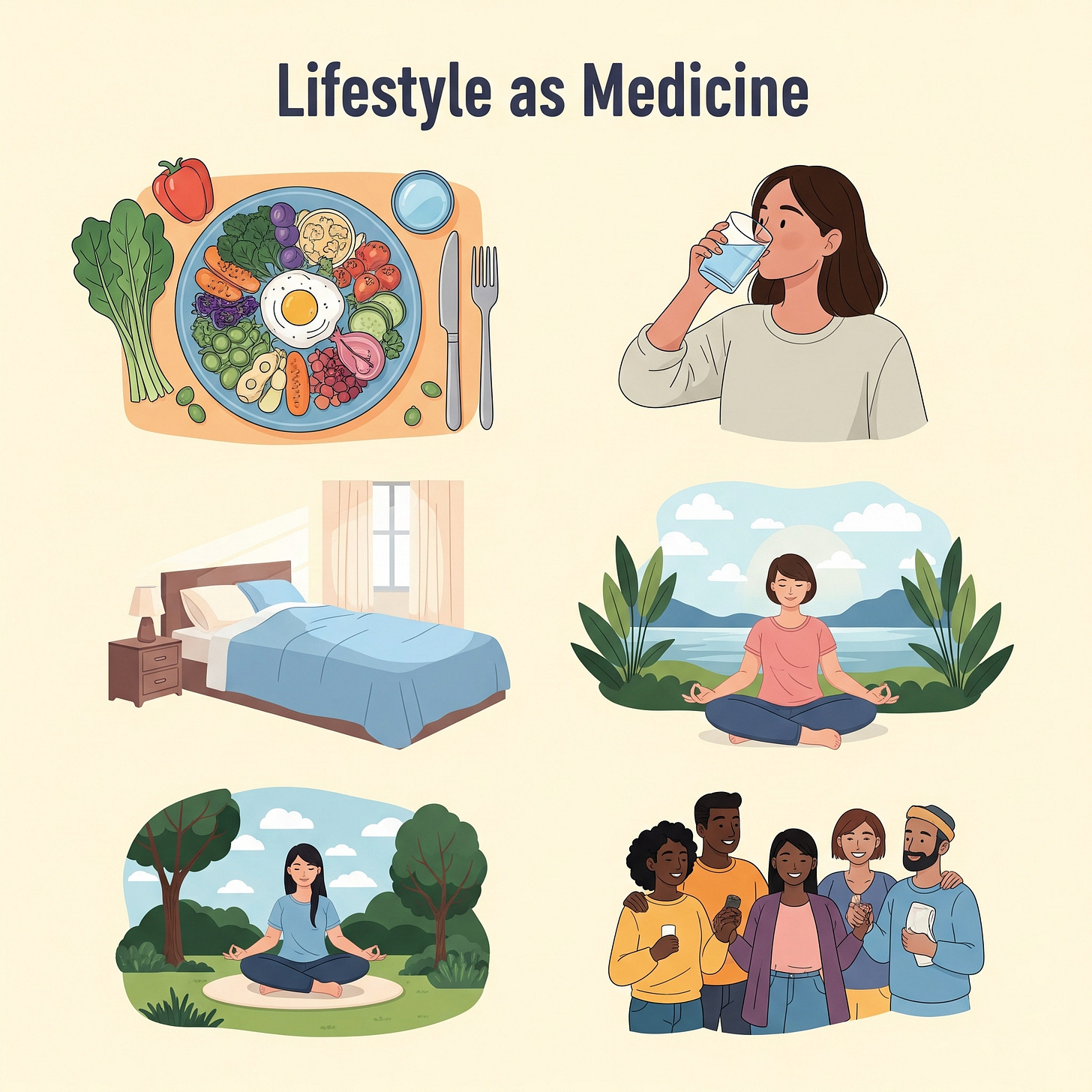A Holistic Path to Well-being
by Dr Issac Mathai Chairman, Managing & Medical Director, Founder, www.soukya.com
Reimagining Health through a Holistic Lens
Holistic health is not a modern invention—it is an ancient philosophy whose time has come again. It is an approach that views the individual as a whole, integrating the physical, emotional, mental, social, and spiritual dimensions of life. Unlike conventional medicine, which often focuses on treating symptoms in isolation, holistic healthcare addresses the root causes of ailments and aims to bring harmony and balance to the entire being.
At SOUKYA, our International Holistic Health Centre, we follow this integrative philosophy, blending time-tested traditional medical systems such as Ayurveda, Homeopathy, Naturopathy, and Yoga with evidence-based complementary therapies like Acupuncture, Reflexology, and Meditation. This approach empowers individuals to activate their innate healing capacities and take proactive steps toward sustained well-being.
The Foundations of Holistic Health
The cornerstone of holistic medicine is the belief that the body possesses an intrinsic ability to heal. Illness, therefore, is not just a set of symptoms to be suppressed but a message from the body indicating a deeper imbalance. A true healing journey begins when the whole person is understood and supported. This includes recognising the connections between the physical body, mental and emotional states, spiritual life and sense of purpose, lifestyle choices and social surroundings.
Lifestyle as Medicine: The Dangers of an Unhealthy Lifestyle
A sedentary lifestyle, poor dietary habits, lack of sleep, constant stress, and toxic relationships create fertile ground for chronic diseases such as hypertension, diabetes, cardiovascular disease, and obesity. These lifestyle-related conditions are preventable, yet they remain the leading causes of mortality globally.
The Rewards of Healthy Living
Adopting a health-oriented lifestyle reaps rewards far beyond physical wellness. It leads to mental clarity, emotional balance, spiritual depth, and increased vitality. A holistic lifestyle integrates movement through yoga or regular walks, consumption of balanced, predominantly plant-based meals, proper hydration throughout the day, restorative sleep each night, practices that nurture mental well-being such as mindfulness or journaling, and fostering meaningful social connections. Scientific research confirms the profound impact of these choices. They not only reduce the risk of chronic diseases but also enhance quality of life and longevity.
Spirituality and the Healing Journey
Spirituality is the silent force that binds all other dimensions of health. In ancient healing traditions, priests and shamans used prayer, rituals, herbs, and energy work to bring about healing. While modern medicine has advanced remarkably, it often neglects this vital dimension.
Fortunately, the World Health Organisation’s 1948 definition of health—"a state of complete physical, mental and social well-being and not merely the absence of disease or infirmity"—lays the foundation for a more inclusive model of healthcare that honours spiritual wellness.
The Pathways to Healing
Healing the Body
Physical illnesses are often the most visible signs of imbalance. Healing begins by nourishing the body and correcting physiological dysfunctions. A person must begin by consuming whole, seasonal foods that are rich in nutrients. Adequate hydration aids detoxification and cellular repair. Sleep, ranging from seven to nine hours, helps restore balance and maintain hormonal health. Moderate movement through activities such as yoga or walking keeps the body active and agile. This is complemented by holistic therapies like Homeopathy, Ayurveda, and Naturopathy which address deeper imbalances and facilitate long-term recovery.
Healing the Mind
Mental health is deeply influenced by how we process emotions and interact with others. Chronic stress, unresolved grief, anger, and fear can manifest in physical ailments. Healing the mind involves a deliberate process of introspection and support. By exploring one’s personal history and recognising recurring emotional patterns, individuals can begin to understand the root causes of their distress. Strengthening emotional resilience may come through mindfulness, reflective writing, or therapy. Stress management is achieved through techniques such as breathing practices, yoga nidra, or visualisation. Releasing suppressed emotions through expressive arts or counselling allows for profound mental release. Introducing positive habits like affirmations and the practice of gratitude further nurtures mental strength and emotional flexibility.
Healing the Spirit
A broken spirit often reveals itself through a sense of despair, disconnection, or loss of purpose. Healing the spirit rekindles a sense of meaning and nurtures inner peace. Spiritual healing begins with reconnecting to oneself through quiet reflection. Spending time in nature allows for a reset of perspective, while practices such as prayer and meditation deepen awareness and connection to the divine. Acts of forgiveness, both of self and others, are essential in unburdening the heart. Contemplative silence offers clarity and self-inquiry paves the path for deeper understanding of one’s role and purpose in life. Through this inner exploration, the spirit regains its vitality and direction.
Mind-Body Disconnect in Conventional Medicine
The prevailing biomedical model often compartmentalises the mind and body. Psychologists treat mental health, physicians treat the physical body, and spiritual concerns are left unaddressed. However, advances in psychoneuroimmunology reveal the intricate ways in which our emotions, thoughts, and spiritual beliefs influence immune function and disease progression.
Research shows that over 80% of chronic illnesses have psychosomatic origins. Anger, fear, guilt, sadness, and other unresolved emotional states weaken the body over time. Diseases such as diabetes, hypertension, arthritis, and even cancer may have roots in emotional trauma.
In my practice, we have seen time and again that patients begin to heal when they address inner conflicts. Archbishop Desmond Tutu, a revered guest at SOUKYA, spoke eloquently of forgiveness as a vital healing force. His life's work in post-apartheid South Africa stands as a testament to the transformational power of spiritual healing.
The Future of Medicine: A Holistic Integration
The global health landscape demands a shift from disease treatment to health promotion. While modern medicine is indispensable in acute care, emergency response, and surgical procedures, it often falls short in managing chronic conditions and addressing root causes.
India is uniquely positioned to lead the way. The Government of India recognises seven official systems of medicine—Ayurveda, Homeopathy, Naturopathy, Siddha, Unani, Sowa-Rigpa, and Allopathy—each with accredited training institutions and practitioners. Institutions like AIIMS are beginning to incorporate these systems, laying the groundwork for an integrative health infrastructure. Initiatives such as promoting yoga, mindfulness, the use of millets, and natural foods are steps in the right direction.
Globally, over 80% of the population uses traditional remedies as part of their primary health care. This underscores a growing need for a healthcare model that combines modern diagnostic precision, traditional therapeutic wisdom, lifestyle-based prevention, and mind-body-spirit coherence.
At SOUKYA, we are witnessing a paradigm shift. People from over 120 countries come to experience an integrative approach that doesn’t just treat illness—but promotes health.
Closing Thoughts: Empowering Self-Healing
True health is not merely the absence of disease but the presence of vitality, purpose, and inner peace. A holistic model of care honours this vision by placing the individual—not the illness—at the centre of the healing process.
By aligning body, mind, and spirit through integrative practices, we return to our natural state of balance. Healing becomes not a reaction to illness, but a proactive and empowering journey.
Let us embrace this vision of holistic well-being, not as an alternative, but as a necessary evolution in global healthcare.
Healing is not just an act—it is a way of life.





Life style is definately spirituality